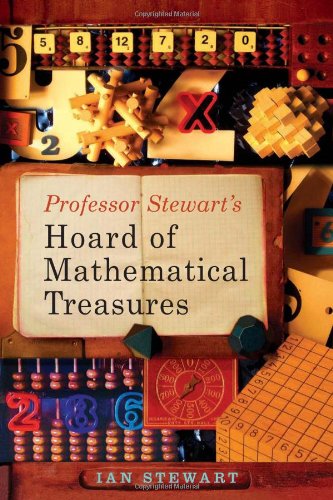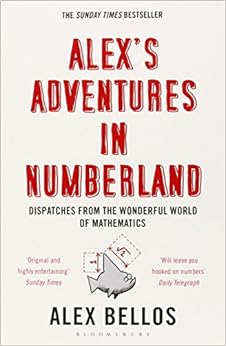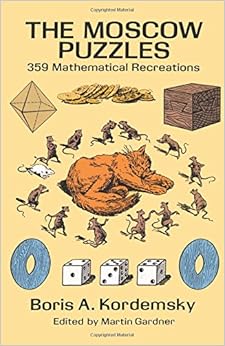- This topic has 37 replies, 22 voices, and was last updated 8 years ago by aracer.
-
six orange sweets
-
aracerFree MemberPosted 8 years ago
I was expecting some sort of trick question, but apparently it was:
There are n sweets in a bag. Six of the sweets are orange. The rest of the sweets are yellow. Hannah takes a random sweet from the bag. She eats the sweet. Hannah then takes at random another sweet from the bag. She eats the sweet. The probability that Hannah eats two orange sweets is 1/3. Show that n²-n-90=0.
It took me about a minute to do in my head, but I did quite a bit of maths as part of my degree (enough to be able to help a girlfriend a year below me doing a maths degree). So hard is that really for 16yos? How hard compared to the O levels we did (for those who did O levels)?
konabunnyFree MemberPosted 8 years agoI don’t understand the maths but I need assurance that in the period mentioned no-one else is taking or adding sweets to the bag, and that all sweets Hannah takes are eaten by her.
whatnobeerFree MemberPosted 8 years agoHannah takes a random sweet from the bag. She eats the sweet. Hannah then takes at random another sweet from the bag. She eats the sweet.
If we can’t take the question as written I think we’re all ****, but then, learning never to take the customers info at face value is a valuable skill 😛
So hard is that really for 16yos?
I think the math itself was reasonably straight forward, but it was the apparent disconnect between the Hannah’s tale at the questions I imagine some would struggle with.
theotherjonvFull MemberPosted 8 years agoI didn’t find it hard, but I’ve always been OK at maths (until you get into the real silly theoretical stuff)
It looked a pretty good question to me, on the basis you want there to be some comprehension aspect (just what is the question, and how do i use maths to solve it?); aspects of probability, quadratic equations and algebra, several different ways to show proof, and if you show workings plenty of chance to get points for knowing what you are trying to do even if you don’t have the capability to do it (eg; getting the fact that it’s 6/n * 5/n-1 even if you can’t then go on to solve from there)
convertFull MemberPosted 8 years agoTalking to a maths teacher, if the question had said “how many sweets in total did Hannah have?” (which would have required you calculating that formula along the way though not rearranging it) or even “demonstrate the formula for the total number of sweets is….” most would have had no issue. It was the disconnect between the two elements that was tricky but more importantly made it look unlike any question they would have seen on a past paper. In an exam environment that is usually enough to throw all but the strongest students.
istoFree MemberPosted 8 years agoI thought it was pretty simple as well only taking a minute or so but it depends how it is aproached as to how easy it is. I dont believe the story about the four accountants taking two hours to solve it.
OnzadogFree MemberPosted 8 years agoI think this question demonstrates an issue with modern education. People are no longer taught to learn and apply but it seems to be more about memorise and regurgitate. I think that’s why the disconnect seems to have bothered people.
I’ve actually noticed the same thing at work. They want to introduce controlling process that removes the need for understanding. Fine when things go to plan, but when they don’t (and they often don’t) people can’t manage because they can’t think.
convertFull MemberPosted 8 years agoI think this question demonstrates an issue with modern education. People are no longer taught to learn and apply but it seems to be more about memorise and regurgitate. I think that’s why the disconnect seems to have bothered people.
To be fair I did O level maths and effectively standardised questions was the same then,30 years ago. Always has been at this (pretty basic) level.
OnzadogFree MemberPosted 8 years agoThe testing might be similar, I feel it’s the teaching that has changed. Mostly because of the modern obsession with kpi and metrics.
convertFull MemberPosted 8 years agoI don’t disagree about the KPI element but I would suggest there is much less “memorise and regurgitate” than there was years ago. In fact basic fact learning is something of a weakness now as so much more education is taught through investigation. There is more ‘coaching’ now (which might have been what you were driving at) but at the same time I’d say most subject curriculums are broader than they ever were and the average number of subjects per student at any given ability level has risen so there is more to cram in to the same amount of time.
PookFull MemberPosted 8 years agoThis was always my problem with maths. I’d just sit there thinking “why the hell does she want to work out some stupid question about n rather than just eating the sweets?”
Still got an A, but found the daft scenarios frustrating.
nickjbFree MemberPosted 8 years agoSeems a pretty straightforward application of probability. Took me a minute or so as well.
As a bit of logical thinking I much preferred the last one of these that went round:
mikewsmithFree MemberPosted 8 years agoThinking back however many years it was when I did GCSE’s and A-levels the coaching and style of papers existed then , we went from normal final papers to modules when I started and we were the guinea pig year for the physics ones, the style took a bit of getting used to and threw a few people. Seems to be some of the comments in the original story that it wasn’t like the practice ones, which is a shame because lifting people out of their comfort zone is one of those things that really helps see who has it and who doesn’t.
crazy-legsFull MemberPosted 8 years agoStill got an A, but found the daft scenarios frustrating.
It’s so it can be related to real life. Innit. 😉
Yes, I found that annoying too, they used to do it in physics papers too. Come up with some weird random scenario in an attempt to show you that knowing this stuff would equip you for dealing with “real life”.The equation isn’t that bad is it? Multiply out two fractions.
mikewsmithFree MemberPosted 8 years agoProbably needs to be a bit more real world.
Johnny has a decent coke habit and steals bikes to fund it, he currently nicks 3 bikes a week. His dealers ups the price by 7% how many bikes per year should he nick, bonus points for suggesting nick more expensive bikes
sammarattiFree MemberPosted 8 years agoI am terrible at algebra.
Please explain how you would work Cheryls birthday out, I dont even know how to begin with that.
Feel free to dumb down
nickcFull MemberPosted 8 years agoSammaratti, you have to work out what they each “don’t” know about Cheryl, rather than what they do.
and also Albert Knows the Month, and Bernard knows the day, they each know that about each other, so you can see that although there are 10 dates, a lot of the days and months are replicated, so can be pretty easily eliminated.
It’s the same with the orange sweets First choice=6/n second choice=5/n third choice =4/n and son on, as she has a 1 in 3 chance
joeydeaconFree MemberPosted 8 years agoSurely that’s based upon the answer, which we have yet to prove.. all we know from the question is that probability of the first sweet is 6 over n, second sweet is 5 over n-1 which when multiplied together equal 1/3?
Edit: nickc changed his post so this no longer makes sense!
StonerFree MemberPosted 8 years agosam, read here.
it’s logic, rather than algebra. (although Im sure it could be done algebraically too)
if you draw a grid – days along the top, months down the side and mark up the dates available, you can work through the logic crossing off possible dates.
EDIT Ive got a few books with similar stuff in I would recommend:
also see The Man Who Counted, which has an interesting back story
http://mathhombre.blogspot.co.uk/2011/03/man-who-counted.htmlit can be found in pdf to download. I have it somewhere.
and finally the Moscow Puzzles are worth reading too. Some based around some great stories and descriptions
BadlyWiredDogFull MemberPosted 8 years agoI’m just concerned that Hannah is eating sweets at all. It’s bad for her health, will potentially cause some sort of insulin spike that might impact on her Strava performance and, in the long term, could lead to obesity and increased strain on the NHS.
A more realistic question might have focussed on Strava times, but as it stands I feel it’s a damning indictment of our society which is going to the dogs along with Helen and her handcart, but that’s another exam question altogether.
nickcFull MemberPosted 8 years agoyeah sorry, realised that I was solving wrong equation.
first choice 6/n second choice 5/n so probability is 6/n x5/n which we’ve been told already =1/3
so just re-arrange from there
sammarattiFree MemberPosted 8 years agoHmm, what I dont get is how you know which days or months to eliminate as there is no indication to what day or month she has told them.
StonerFree MemberPosted 8 years agoread alex bellos’ answer in my link again. Slowly. It takes a couple of run-ups 🙂
ourmaninthenorthFull MemberPosted 8 years agoI’m hopeless at this stuff (much to my frustration) and am now annoyed at Dr North who finds it obvious.
But then I reminded her I earn twice what she does by exploiting human nature when negotiating contracts.
Horses for courses innit?
captainsasquatchFree MemberPosted 8 years agoI find these to be like magic eye* for others. I look the question and the answer can simply jump out at me and be blatantly obvious within a couple of seconds.
*Magic eye I can’t do.maccruiskeenFull MemberPosted 8 years agoHmm, what I dont get is how you know which days or months to eliminate as there is no indication to what day or month she has told them.
Bernard could only know the full date if the number he’d been told isn’t repeated anywhere – so if he’d been give a number that only appears once on the list he’d know the full date. Therefore Bernard has been told a number that appears more than once
Albert knows the month he’s been told only contains numbers that are repeated – both the numbers in July appear elsewhere on the list – so he knows that Bernard must have been told one of there two dates in July, but that he would be unable to deduce which month they relate to.
So Albert telling Bernard that he knows he doesn’t know the answer tells Bernard that month must be one with only duplicate dates in -so he effectively tells him what month it is – May and June both have unique dates – Bernard knows its the 16th and theres not a 16th in August.
NorthwindFull MemberPosted 8 years agoI quite like it- one of our complaints is that high school maths often teaches the maths but isn’t great at showing application. So our maths guys cry out for more problemsolving, as opposed to just basic maths.
(frinstance, my brother knows how to calculate the angles of a triangle if the question looks like this:
But he wouldn’t know where to start if it looked like this:
convertFull MemberPosted 8 years agoI quite like it-
Again, it’s nothing new as a type of question, in fact pretty standard. It’s just the exact wording (or lack of) of the last sentence that confused.
Our gang don’t do that paper but do the IGCSE qualification from EDEXCEL. Apparently they played with that paper too – instead of asking for the nth term in a sequence they asked for the nth+1 term. Nothing radical but not something the students would have ever seen on a past paper expressed in quite that way. HoD of maths here reckons its the board testing out a few things ready for all the massive changes happening next year with GCSE.
NorthwindFull MemberPosted 8 years agoconvert – Member
Again, it’s nothing new as a type of question, in fact pretty standard. It’s just the exact wording (or lack of) of the last sentence that confused.
That’s what I like about it- they basically need to solve the wording first.
aracerFree MemberPosted 8 years agoI don’t get it. What’s difficult about the last sentence?
So if I understand correctly the maths isn’t something which should be a problem for them, it’s just that the question isn’t worded quite the same as the ones they’ve done on test papers.
konabunnyFree MemberPosted 8 years agoI don’t get it. What’s difficult about the last sentence?
Is the ambiguity around where the probability applies to the probability of that happening over the sequence of events described or the probability that applies now, after the sequence of events has completed?
Also, the Cheryl problem has text ambiguities/mistakes, which complicates things.
convertFull MemberPosted 8 years agoSo if I understand correctly the maths isn’t something which should be a problem for them, it’s just that the question isn’t worded quite the same as the ones they’ve done on test papers.
Correct. If the question’s last sentence had read ‘Prove the total number of sweets in the bag can be expressed as………’ it would have been a non story. The whole thing would have been a typical GCSE question, but probably one only correctly answered by the higher ability candidates; but the less ability ones would have better understood what it was they couldn’t do. An assumption was made that the candidates would makes the connection that n was the number of sweets. That’s really all there was in it.
My guess is that written their way or my way would make very little difference to the number of GCSE level students who would actually get it right, Its the confusion of the less able ones who wouldn’t have got it correct anyway which differs. And as everyone knows twitter is for morons, so it’s not surprising that’s where they chose to protest 😉
aracerFree MemberPosted 8 years agoAh, so the actual problem is that 16yos can’t maintain concentration for long enough to remember that the first sentence is “There are n sweets in a bag.” by the time they get to the end of the question? 😈
The topic ‘six orange sweets’ is closed to new replies.






